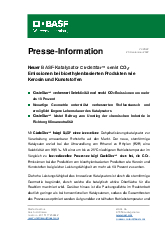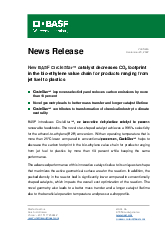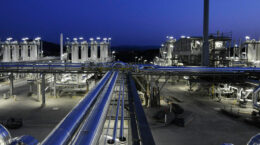New BASF CircleStar™ catalyst decreases CO2 footprint in the bio-ethylene value chain for products ranging from jet fuel to plastics
- CircleStar™ improves selectivity and reduces carbon emissions by more than 10 percent
- Novel geometry leads to better mass transfer and longer catalyst lifetime
- CircleStar™ contributes to transformation of chemical industry to climate neutrality
BASF introduces CircleStar™, an innovative dehydration catalyst to process renewable feedstocks. The novel star-shaped catalyst achieves a 99.5% selectivity for the ethanol-to-ethylene (E2E) conversion. With an operating temperature that is more than 25°C lower compared to conventional processes, CircleStar™ helps to decrease the carbon footprint in the bio-ethylene value chain for products ranging from jet fuel to plastics by more than 10 percent while keeping the same performance.
The advanced performance of this innovative catalyst is due to its unique star shape that maximizes the active geometrical surface area for the reaction. In addition, the packed density in the reactor bed is significantly lower compared to conventionally shaped catalysts, which impacts the overall cost optimization of the reaction. The novel geometry also leads to a better mass transfer and a longer catalyst lifetime due to the beneficial operation temperature and pressure-drop profile.
The E2E process plays a fundamental role for the chemical industry to transform to climate neutrality and to achieve their net-zero targets. BASF has in-depth experience for more than 25 years in E2E with dedicated catalyst development and testing available. The existing Ethylene is 99 percent fossil-based while the BASF E2E catalyst is offering the possibility to change the Ethylene and its downstream value chain to make it bio-based. In this process, CircleStar™ helps to further decrease the CO2 emissions in the bio-based route by enabling lower temperature operations, longer lifetime and lower pressure drop in the catalyst bed.
“Our novel CircleStar™ for the bio-ethanol to bio-ethylene conversion has excellent product properties and helps our customers to significantly increase their production efficiency while reducing carbon emissions and supporting their net zero targets,” said Detlef Ruff, Senior Vice President, Process Catalysts at BASF.
Kerstin Hoffmann
Media Relations
BASF SE
67056 Ludwigshafen
http://www.basf.com
+49 621 60-29875
Send email
New BASF CircleStar™ catalyst decreases CO2 footprint in the bio-ethylene value chain for products ranging from jet fuel to plastics- German
pdf (150.229 KB)
New BASF CircleStar™ catalyst decreases CO2 footprint in the bio-ethylene value chain for products ranging from jet fuel to plastics- English
pdf (147.583 KB)


